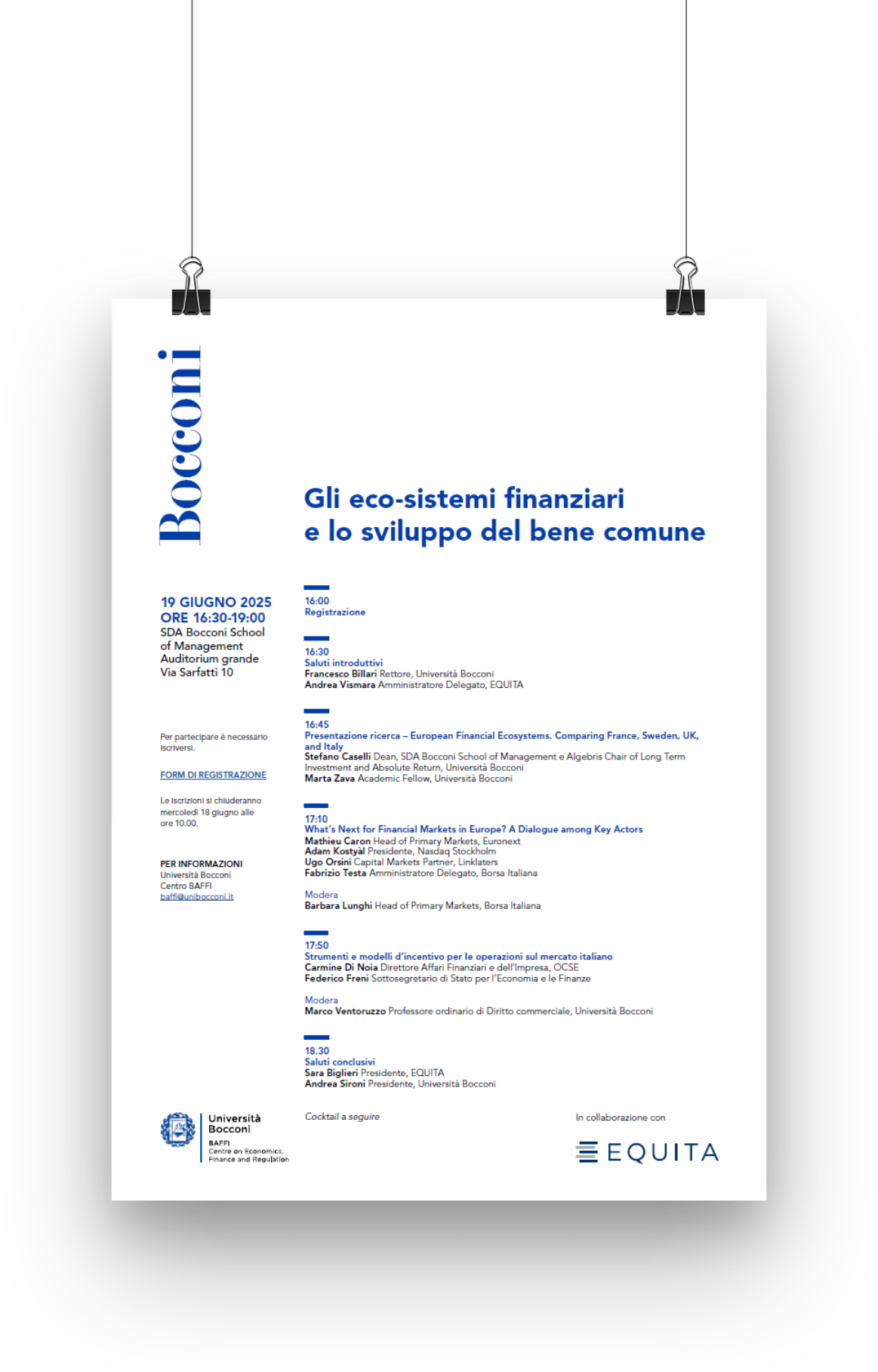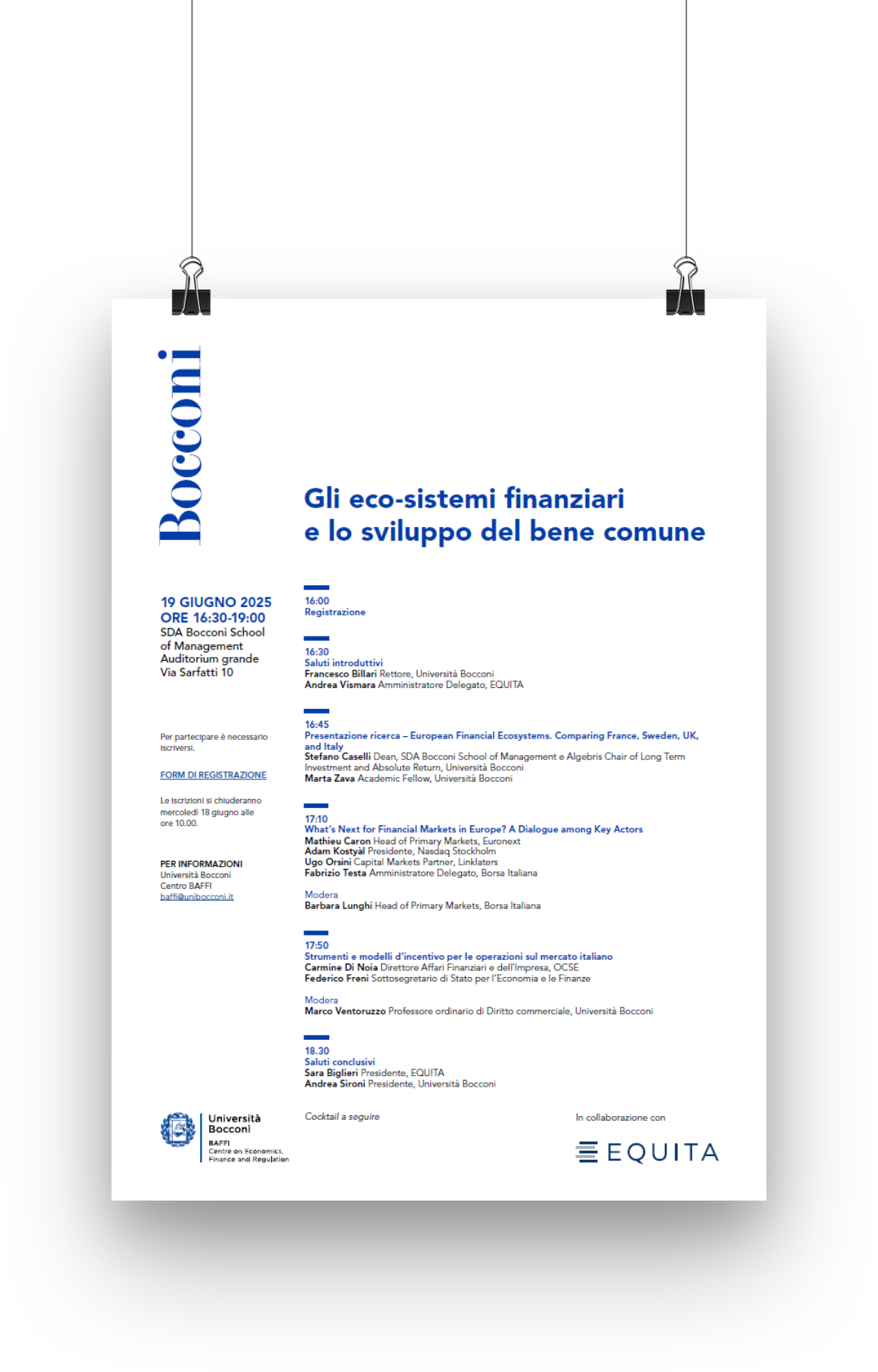
EQUITA-Bocconi 2025: "Financial ecosystems and development of public good"


Bocconi University and EQUITA present: “European Financial Ecosystems: Comparing France, Sweden, UK and Italy”. What can we borrow from other European economies to improve the Italian financial ecosystem?
Milan, June 19th, 2025 – Now that Europe is committed to strengthening and developing its Capital Markets Union (CMU) and the Savings and Investments Union (SIU), each state is required to rethink its industrial policies and the role of financial ecosystems in the development of the public good.
On the basis of this premise, today’s event (sponsored by EQUITA and Bocconi University as part of their long-term partnership aimed at fostering the development of capital markets in Italy, this year to its 12th anniversary) is focused on understanding the importance of financial ecosystems and presenting the key findings of the research realised by the BAFFI Center.
The paper (“European Financial Ecosystems: Comparing France, Sweden, UK and Italy”) examines and compares the French dirigiste system, the Swedish social democratic system, the British liberal system, and the Italian bank-centric system. The aim of the study is to illustrate how each of these countries integrates best practices on legislation and regulation, taxation, investors, and financial intermediaries, which are all necessary conditions to develop an efficient financial ecosystem.
The key takeaways were presented by Stefano Caselli (Dean at SDA Bocconi School of Management and Algebris Chair of Long Term Investment and Absolute Return) and Marta Zava (Academic Fellow at Bocconi University). Evidence clearly demonstrates that there are viable paths to positively develop our market, even under the existing European regulatory framework. All successful examples analysed in the research have several common features: capital markets are treated as a public good, pension systems promote investment in pension funds, financial education is widespread, and structural fiscal support for the sector exists.
Research suggests some concrete actions. First of all, the encouragement of household investment in equities through dedicated financial tools. Sweden’s ISK accounts, France’s PEA and PEA-PME plans, and the UK’s ISA prove that well-designed tax incentives can drive long-term market participation. Moreover, institutional investors and state-backed financial institutions can play a decisive role in stabilising markets and channelling capital efficiently. For instance, France’s Caisse des Dépôts et Consignations (CDC), which manages €1.1 trillion, has been instrumental in supporting strategic investments and its subsidiary CDC Croissance, which specialises in SME and mid-cap financing, stepping in where private capital is hesitant. Pension funds are another critical source of long-term capital, as demonstrated by Sweden and the UK. Sweden’s pension system, which combines state-backed AP funds with private occupational schemes, ensures broad capital market participation. The UK, on the other hand, is now consolidating 86 local government pension schemes into eight “megafunds” of over £50 billion each, a strategy designed to unlock £80 billion for investment in infrastructure and businesses.
Italy should emulate successful ecosystems like the French, the Swedish and the UK ones, by working on concrete and impactful actions, independently from the expected outcomes of the ongoing European initiatives, also considering the fragility of our capital markets and the urgency needed to revamp our market.
The event has also featured the opening remarks of Francesco Billari (Dean at Bocconi University) and Andrea Vismara (CEO at EQUITA), as well as the roundtable “What’s next for financial markets in Europe? A dialogue among key actors”, where Barbara Lunghi (Head of Primary Markets at Euronext) moderated an insightful conversation involving Mathieu Caron (Head of Primary Markets at Euronext), Adam Kostyàl (Chairman Nasdaq at Stockholm), Ugo Orsini (Capital Markets Partner at Linklaters) and Fabrizio Testa (CEO at Borsa Italiana). This was followed by a discussion focused on the available tools and possible incentives to improve capital markets in Italy, featuring an insightful dialogue between Marco Ventoruzzo (Full Professor of Corporate Law at Bocconi University), Federico Freni (Undersecretary of State to the Ministry of Economy and Finance) and Carmine Di Noia (Director for Financial and Enterprise Affairs at OECD).
The event ended with the closing remarks of Sara Biglieri (Chairman at EQUITA) and Andrea Sironi (Chairman at Bocconi University), who confirmed the importance of developing a well-functioning financial ecosystem, contributing to the overall economic welfare of a country.
Read the research "European financial ecosystems"

